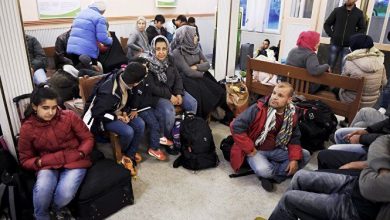Is Europe dying?
On January 8, a report on social development and employment in “Greater Europe” was published in Brussels. According to press reports, it became evidence of “the dramatic stratification of Europe, which has been frighteningly aggravated over the past 5 years.”
“Europe is on its last legs” – this is how the head of the Italian region Apulia Niki Wendola expressed himself expansively in the south of last year in an interview with German radio Deutschlandfunk during his stay in Berlin. And after a few days, almost no similar gloomy conclusions came is a regional politician, and the European Commission itself.
We are talking about the report on social development and employment in “Greater Europe” presented on January 8 in Brussels, which was made by the EU Commissioner for Market, Employment and Social Affairs, Laszlo Andor. The report, which has more than 450 pages, was, according to the press, evidence of “the dramatic stratification of Europe, frighteningly aggravated over the past 5 years.”
“A new gulf is growing between countries falling into the grip of a downward spiral of declining production, rising unemployment and declining incomes, and those states that demonstrate good or at least some resistance to the crisis,” the abovementioned said European Commission document.
In November last year, according to the report, the average unemployment rate in the eurozone countries reached 11.8 percent. This is the maximum figure for the last 20 years. And if 5 years ago the unemployment rate was approximately the same in the northern and southern parts of the EU, today the gap is 7.5 percent. And the proportion of Europeans who have been unemployed for a long time has increased to almost 5 percent. A particularly critical situation has developed in countries such as Spain, Greece, Ireland, Slovakia, Estonia, Latvia and Lithuania. For example, among Greek and Spanish youth, the unemployment rate has risen to 56.7 percent. The total number of unemployed in the eurozone countries has reached 18.8 million people, and in the EU as a whole – 26 million. These are record numbers.
And improvement of the situation, according to European Commissioner Laszlo Andor, is not yet in sight. At the same time, he called on the leaders of countries sliding down the “spiral” he referred to to “still not lose courage.” Advice, of course, is good. Only to whom and how can he help? Apulia Niki Wendola places the main burden of guilt on the “mediocre” politicians of Europe – first of all, on German Chancellor Angela Merkel. They are proud of, Vendola sarcastically remarked, that, in essence, they “raised madness to the law”, demanding from the EU countries the introduction of the so-called “debt brake”.
Against social cuts “crazy and senseless” these days, the expert on social issues of the Socialist faction in the European Parliament, Jutta Steinruk, spoke out. The report of the European Commission clearly shows, said Steinruck, that the policy of “dictatorship of economy” plunges entire countries and peoples into poverty and, in some cases, exacerbates the crisis. Professor Oleg Barabanov, head of the EU and Council of Europe Department of Politics at the Moscow State Institute of International Relations, sees the cause of the dramatic gap between the north and south of Europe in EU enlargement policy, when “equalization funds” were redirected from the south to eastern “newcomers”. Now a kind of vicious circle has formed.
“The path of super-tight spending cuts is useful for straightening budget indicators,” the professor says, “but it holds back economic growth. Under normal conditions, the recipe for getting out of this situation is, unfortunately, associated with currency depreciation, which again affects consumers. But in this In this case, this recipe is not applicable, since members of the eurozone do not manage their currency. In addition, the funds of the Nordic countries are not infinite either. And all this is just a delay in the catastrophe, which could be even stronger than if it were any aru years ago. “
But Matthias Rossi, an expert on issues of state and law at the University of Augsburg in Germany, considers the lack of proper solidarity among EU citizens an important problem:
“In my opinion, the feeling of solidarity in the EU is perceived by citizens as a heavy burden. – Some do not realize that they are citizens of a united Europe. If you ask them if they agree to transfer part of their funds to solve problems in Spain, Greece or Portugal, then at first they would show their solidarity to a certain extent, but then they would very quickly forget about it. “
Be that as it may, returning to the question of whether Europe “dies”, one thing can be said: if there is debate about it, then it is alive.
The EU is a victim, not a cause of crisis – Jose Manuel Barroso
The EU is a victim, not a cause, of the international financial crisis. This opinion was expressed by European Commission President Jose Manuel Barroso in an interview published today by The Irish Times before meeting with Irish Prime Minister Enda Kenny.
The politician believes that Europe’s reaction to the crisis was “simplified” and “ridiculed.” “This crisis was not created by the European Union. This crisis was the result of the volatility of public debt created by national governments and the irresponsible financial behavior of credit institutions with the connivance of national regulatory authorities,” expressed Jose Manuel Barroso’s confidence. “The EU is a victim of the crisis, not its cause “We are not a problem, we are part of the solution.”
The EC Chairman said that sometimes during the debate the international financial crisis is associated with the euro. “This is not so. The reality is that countries that are not in the euro area are among the most affected,” Barroso said. “For example, the country that did the most to mobilize taxpayers to support the banking system was Great Britain, and not a member of the eurozone, nor should the case of Iceland be forgotten.
According to the politician, austerity measures were also mistakenly described as European politics. “Some people are trying to connect austerity measures in the field of public finance with the euro. This is a myth. The UK has faced the most difficult budget situation since the Second World War, and this country is not a member of the euro zone. There are certain problems with the financial stability of the eurozone , but this is due to the existing differences between the 17 member countries of the association, and this is precisely what we are trying to solve, “stressed the EC chairman.
Jose Manuel Barroso did not rule out that the forthcoming long-term budget of the EU (for 2014-2020) could be agreed upon in February. “Yes, I think that an agreement is possible in February, but the positions are still very divergent. We need an immediate solution,” he summed up.
Austerity measures in EU lead to record unemployment
The unemployment rate in the eurozone countries – 11.8% – was the highest over the past 20 years. The largest number of unemployed are in Spain and Greece, where in times of crisis the authorities are taking tough austerity measures.
According to the European statistical agency Eurostat, as of November last year, about 19 million people were officially registered as unemployed in the euro area, which is 113 thousand more than the previous month. In general, in the European Union, which unites 27 countries, the unemployment rate in November 2012 exceeded 26 million people.
According to several European analysts, the employment situation in the coming year will not improve, and this may lead to a social explosion in a united Europe. According to expert estimates, during 2013, the unemployment rate in the eurozone can reach 12%.
The situation was commented on by the famous economic journalist from France Eric le Boucher:
“Europe will be the only continent in recession in 2013. This region of the world is most affected by unemployment. And the situation will not be corrected, on the contrary. In the countries of southern Europe, social security systems no longer have the means to provide basic protection. This is illustrated by the situation in Greece “The social situation in these countries is apocalyptic and worthy of the 1930s. However, at the same time, the unemployment rate in Germany is only 5.4% and in Austria – 4.5%. Europe is very dangerously split in two.”
As of November 2012, a record number of unemployed were registered in Spain – 26.6%. In Greece, which provided data for September, it reached 26% of the economically active population. In both countries, up to 60% of young people are unemployed.
These record highs contrast sharply with unemployment rates in Germany, the Netherlands or Luxembourg, where they do not exceed 6%. If five years ago unemployment in the northern and southern parts of the European Union was approximately at the same level, today the gap is 7.5 percentage points.
Says the European Commissioner for Labor Market, Social Issues and Social Integration Policy Laszlo Andor:
“We are experiencing the effects of the financial and economic crisis and recession. As a result, unemployment in the European Union has reached levels unheard of in almost the last two decades. The social situation is also deteriorating.”
The European Commission has already sounded the alarm in connection with the deepening “gap” on the situation with social development and employment between the countries of the central part and the periphery of the EU. Presenting reporters a report on social development and employment in the EU, prepared by the European Commission, Laszlo Andor said that the economic crisis has nullified the progress made in employment.
A member of the executive branch of the European Union acknowledged that a drastic improvement in the socio-economic situation in a united Europe in 2013 is unlikely.
Laszlo Andor pointed out the fact that most social protection systems in the EU countries have largely lost their ability to protect family income from the negative effects of the crisis. Moreover, young Europeans, unemployed women and single mothers in the countries of the south and east of the EU found themselves in the worst situation. Serious financial difficulties today are experienced by every fifth family in Bulgaria, Greece, Hungary, Romania, Latvia and Cyprus.
In contrast, household incomes during the crisis period grew in the Scandinavian countries, Germany, France and Poland, which have strong social security systems and stable labor markets.
To improve the situation, according to European Commissioner Andor, the European Union as a whole and the eurozone in particular need to pursue a more integrated social and employment policy, invest in the social sphere and expand the possibilities for retraining of unemployed and advanced training for workers.
This post is also available in:
 English
English  Русский (Russian)
Русский (Russian)






